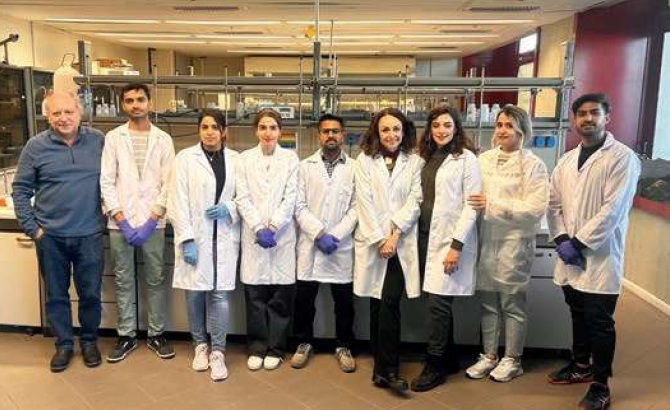Ateneapoli news magazine (n. 2 Feb. 9 2024, pag. 16)
Industriai Chemistry for Circular and Bio Economy. A master’s degree that trains figures for “the transition of the chemical industry.”
Translated text of the article that appeared in Ateneapoli No. 2 Feb. 9 2024 by Claudio Tranchino
The goal of the course, geared toward process development, is to prepare figures who should enact the transition of the chemical industry.” Prof. Martino Di Serio, condenses in this short formula the purpose of Industriai Chemistry for Circular and Bio Economy, a Magistral he coordinates, born from the joining forces of the Department of Chemical Sciences of the Federico II University and the Polytechnic University of Turin. A year and a half after the presentation – which took place on June 27, 2022 in the presence of the Rectors Matteo Lorito and Guido Saracco – the professor welcomes Ateneeneapoli to his studio to check on the state of the art and first of all reiterates that on “a new vision of chemistry that is less impactful and on the paradigm shift of production and raw materials, we in the Neapolitan research group of industrial chemistry (as well as that of the Polytechnic) have been working on it for 20 years, beyond any fad of the moment.”
For the prospects of the Course – it should be remembered, entirely in English – the coordination set two goals from the very beginning: to attract foreign students and not to go beyond 30 enrolled students to ensure a direct relationship with companies. True, for a statistic on the attractiveness of the trained students we have to wait – the first graduates will be there not before October 2024 – but, as an insider, Di Serio explains why the professional future will be bright.
“The history of the chemical industry in Italy is linked to the development of petrochemicals. Those technologies, developed mainly in the 1970s, were also sources of additional income for engineering companies, which sold them all over the world. Today those processes no longer have great appeal in our country, but being in a transition situation there is a need to develop new ones.” The Magistrale is well on its way to internationalizing the pathway. Already, because of the 22 enrolled “a good 80 percent are Iranian, about 15 percent are from Pakistan, and we also have presences from Uganda, India and Morocco. Not forgetting a couple of Italian girls.” And Di Serio is satisfied, “these are the numbers I would have expected. I’m also happy with the gender balance and, in particular, welcoming girls from Iran.”
Then he adds, “We worked on sponsoring the Course on social media, from which we launched several drops. The results were very good. About 250 applications were received, and we verified 150 of them. Of the latter, about a hundred were sent to the Embassies from the Universitaly platform (gateway that allows you to enter the world of Degree Courses and higher education in Italy, ed.).” Already, because all foreigners who plan to enroll in Industriai Chemistry for Circular and Bio Economy must register on the mentioned platform, wait for the teachers to assess the level of English, Cv, cover letter and, in case of positive judgment, wait for the Embassy to call to provide the Visa.
Didactics between Turin and Naples
But the real novelty of the Course is the didactics, halfway between Turin and Naples. “Knowing well the problems students have in arriving on time for classes, we have created top-notch MOOCs (prerecorded courses), thanks to the crucial support of Federica Web Learning, which allow students to take the first semester from their home country. These are classes taught by both Federico II and Politecnico faculty.” Of note is the importance of the first six months, during which the curriculum is calibrated to each student’s background in order to have a class of students with unified knowledge arrive in Naples for the second semester. The beginning of the second year, however, takes place entirely in Turin; while the concluding six months are all to be devoted to the thesis and to the internship to be carried out re at an institution or company of the student’s choice, both in Italy and abroad. There is also no shortage of specific forms of financial support for foreigners: “something more uni c than rare: the Federico II does not ask them for fees and even provides scholarships. Moreover, the offices also do a great job as much the secretariat as the one at internationalization guiding the students through the maze of Italian bureaucracy.” Finally, Di Serio sets the next steps: “We need to consolidate the number of enrolled students and raise the level of the quality of the entry selection. From the first theses on, we could actually realize whether the training stay in Italy will have really helped the students.”
More information at: Industrial Chemistry for Circular and Bio Economy | Dipartimento di Scienze Chimiche (unina.it)

